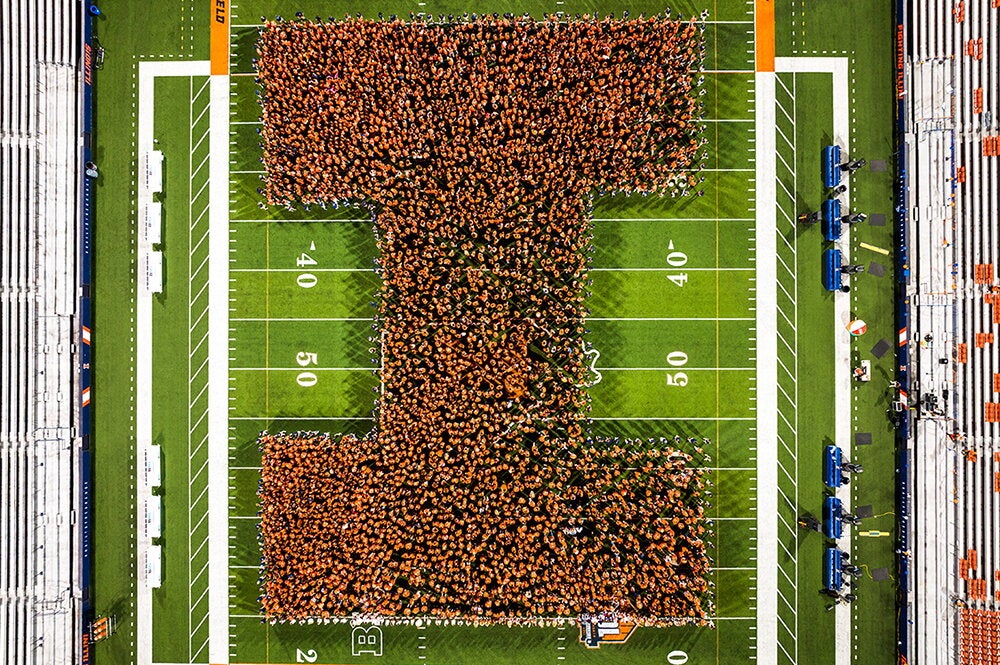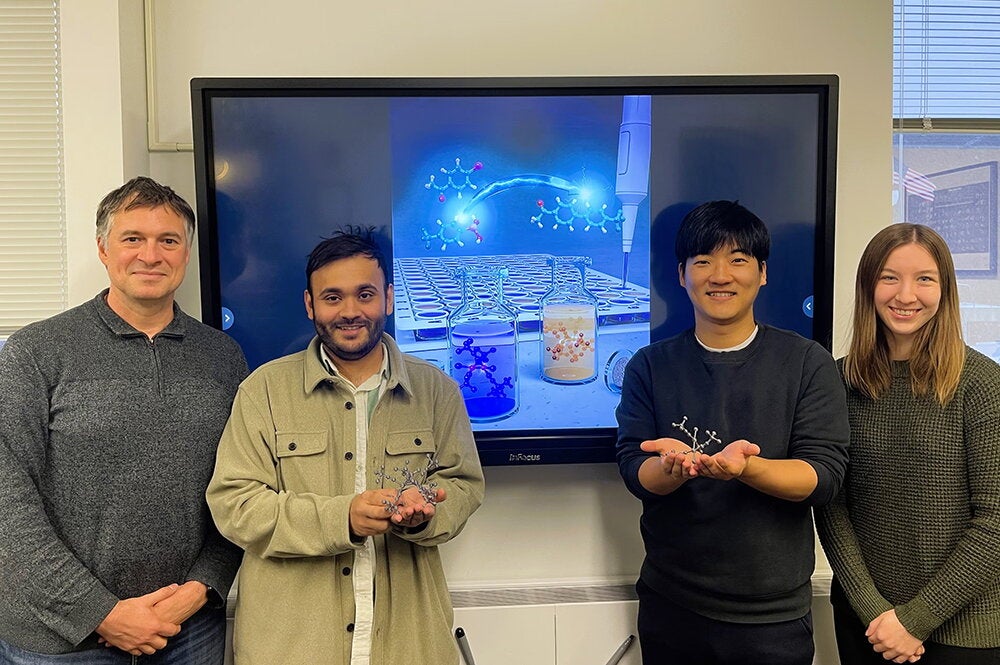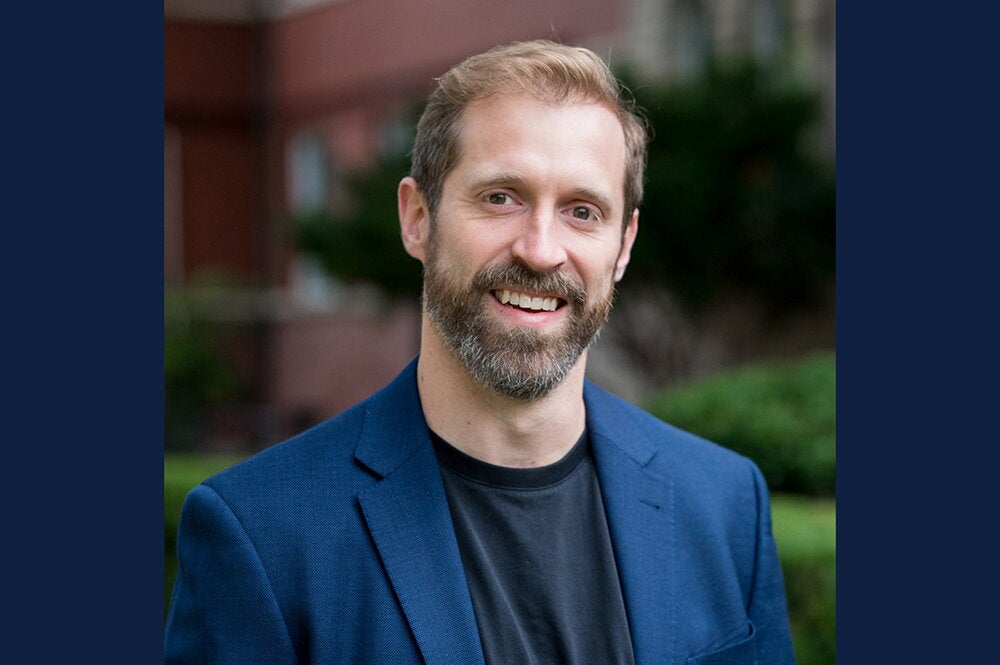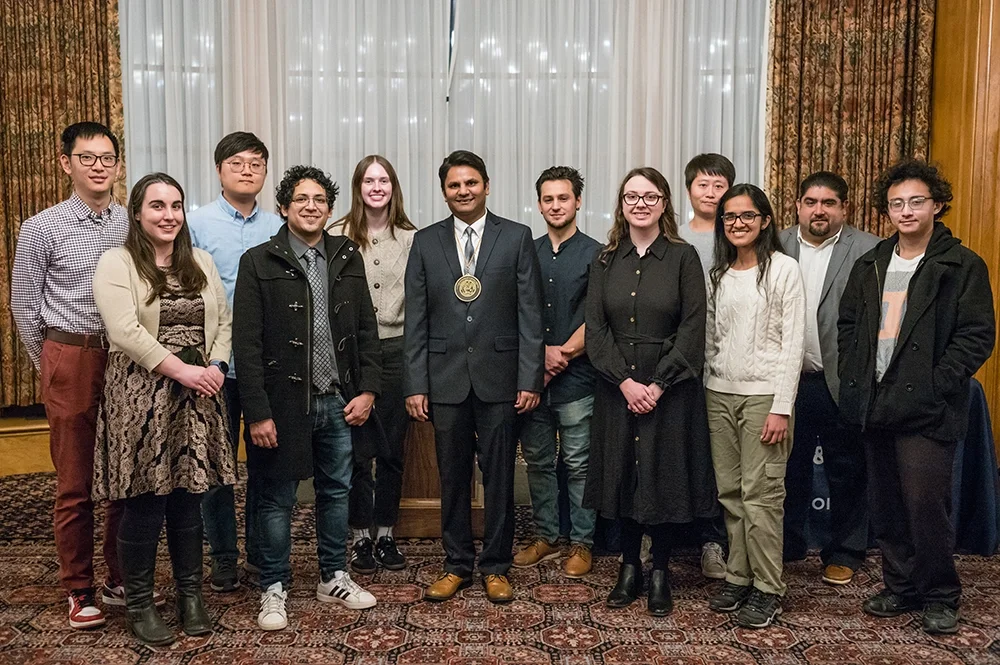
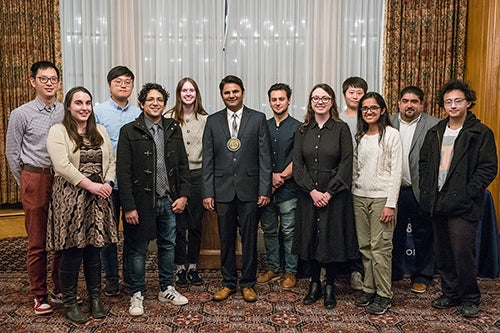
As a top university student in India who was working toward a career in engineering, chemistry seemed far from the destiny of Prashant Jain. But his curiosity about the atomic world ultimately led him to discover his lifelong scientific passion, using light to move electrons.
“I was in no way destined to become a chemist or even an academic… There were some sparks of curiosity in childhood, some twists along the way and the influential people who touched my life. Most of all, I owe it to my parents,” said Jain, whose education and career led him to the University of Illinois at Urbana-Champaign, where he has become a renowned, distinguished and ground-breaking physical chemist and educator.
In a recent ceremony on the University of Illinois Urbana-Champaign campus, Jain was invested as the G.L. Clark Professor of Chemistry with university leaders, colleagues, students, family, and friends in attendance to honor him and his accomplishments.
As Venetria K. Patton, Harry E. Preble Dean of the College of Liberal Arts & Sciences, said during the ceremony, investiture as a named professor is one of the highest honors that a faculty member can receive.
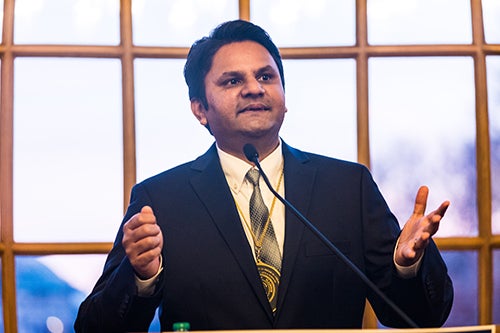
“This recognition is not given lightly or frequently and named positions require exceptional contributions to research, teaching, and service. Today we add Prashant Jain to that list of impressive colleagues,” Patton said. “Professor Jain has distinguished himself as an innovative award-winning researcher and educator. He has been recognized by his students and colleagues alike for his impact as a teacher and has led by example while serving in administrative roles and committees within the Department of Chemistry.”
Kevin Jackson, vice provost for undergraduate education at Illinois, said it is a celebration of professor Jain’s many accomplishments as a scholar, an innovator, a leader, collaborator, and educator.
“Professor Jain is widely known for his vision and leadership in the scientific community and is a world renown highly cited scholar in the areas of artificial photosynthesis, catalysis, and fundamental nanoscience. As an educator he has been recognized for his teaching of physical chemistry having won the School of Chemical Sciences faculty teaching award and recognition on the university’s excellent teachers list nearly a dozen times,” Jackson said.
Jain said it is truly an honor to be recognized and invested as the G.L. Clark Professor of Chemistry and associated with the legacy of G.L. Clark as well as the late Dr. Eugene Bertin, his family, and friends.
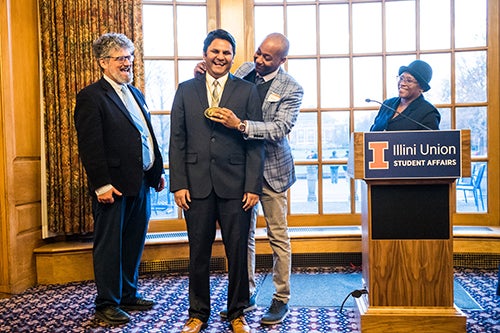
Bertin was a distinguished chemistry alumnus of the University of Illinois, whose gift established the professorship in honor and in memory of his teacher, mentor, and friend, the late professor George L. Clark, who was at the forefront of X-ray advancements and inspired Bertin to become a national figure in the field of X-ray fluorescence spectrometry.
Jain, who has been a faculty member in chemistry at Illinois since 2011, said the university and College of LAS have continued to cultivate an atmosphere where scholarship and mentorship are valued.
“We practice the ethos that knowledge and new frontiers lead and then the enrollments, the dollars, the economic and societal impact will follow. So, I’m very glad I chose Illinois as my home. Every single day I’ve taught I’ve felt the energy and wonder of my students as they open their eyes to the statistical nature of chemistry and the world around them,” Jain said.
One of the pivotal twists on Jain’s path to Illinois occurred as a graduate student at Georgia Tech when he chose a quantum mechanics class instead of a polymers class, simply to solve a time conflict. The course was taught by Mostafa El-Sayed, who became Jain’s advisor and one of his most influential teachers and role models.
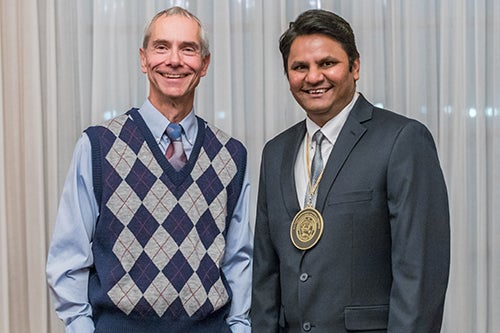
“He was already a living legend in physical chemistry, but one of the nicest, kindest, and most inspiring people I have ever met. I joined his group. And that’s where I found my lifelong scientific passion, using light to move electrons around,” Jain said. “Even well into his 70s, Mostafa was deeply curious, always eager to learn and deeply caring about his students and that’s when I knew that’s the kind of life and career I wanted.”
With El-Sayed, Jain investigated the flow of energy in metal nanoparticles using ultrafast spectroscopy and theoretical electrodynamics. Following his PhD, Jain went on to Harvard as the first postdoctoral researcher in Adam Cohen’s lab, where he helped launch a research program on magneto- and chiro-optical phenomena. Then, an offer of a Miller Fellowship took Jain to UC Berkeley, where he studied ionic nanocrystals with Paul Alivisatos.
Jain considered returning to India to continue his career but had multiple university faculty offers, including one from Illinois. Fellow chemistry faculty member Martin Gruebele said he had heard about Jain’s work around that time in 2010 and then heard him present his work.
“I was blown away by your research talk and my p-chem colleagues and I did everything we could to get you to Illinois. And fortunately, we succeeded,” said Gruebele, who spoke at the investiture ceremony. “I consider myself really lucky to have a colleague like you, Prashant, an all-around great scientist and human being.”
At Illinois, Gruebele said, Jain’s work has branched out in many directions, working on plasmons that are made of just a few electrons – a concept that was thought impossible at the time – and working on converting greenhouse gas into valuable fuel as well as rearrangements of ions and super ionic solids, topological insulator theory, and more.
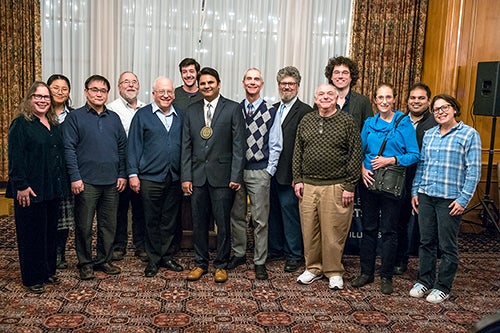
“Some of his work has led to patents, such as a room temperature non catalytic process for chlorinating methane. Chemists always need to heat things in catalysts, so it’s pretty special if you can do it at room temperature without (a catalyst),” explained Gruebele, who added that Jain’s work has garnered many awards and recognitions.
In addition to G. L. Clark Professor of Physical Chemistry in the Department of Chemistry, Jain is also a University Scholar, professor of the Materials Research Lab, and an affiliate faculty member of the Department of Physics and the Illinois Quantum Information Science and Technology Center.
Jain’s lab specializes in the study of the interaction between energy and matter and imaging chemical phenomena on the nanoscale. His noteworthy recent contributions are discoveries of plasmon resonances in semiconductor nanocrystals and plasmonic redox catalysis for green manufacturing of chemicals.
His work has been published in over 110 papers, cited 32,000 times, and recognized, among other awards, by a Presidential Early Career Award in Science and Engineering, a Guggenheim Fellowship, the Leo Hendrik Baekeland award, the ACS Kavli Emerging Leader in Chemistry award, the Beilby medal, a Sloan Fellowship, an NSF CAREER award, and selection as an MIT TR35 inventor.
Jain is a fellow of the American Physical Society, a fellow of the Royal Society of Chemistry, a fellow of the AAAS, and a Kavli Fellow of the National Academy of Sciences. He teaches graduate and undergraduate physical chemistry for which he has received recognition, including the School of Chemical Sciences Faculty Teaching Award and a mention on U of I's Excellent Teachers list a dozen times and for every course he has taught. Jain has served as associate head of major projects in the Department of Chemistry and chair of the chemical physics PhD program. He also serves on the staff committee and as the diversity advocate for the Department of Chemistry.
Jain and his spouse, Dr. Zhaleh Ghaemi, a computational biophysicist, live in Urbana with their daughter.
“My life and career would be incomplete without my wife, Zhaleh, a computational biophysicist who has her own exciting career, and ambitious scientific ventures, and yet she still makes time to support me in every possible way,” Jain said. also thanked his colleagues in the Department of Chemistry for their support.
“I feel very lucky and very fortunate that I count many friends among my colleagues,” said Jain, who then thanked the current and former members of his research group. “It’s been a privilege to see you grow personally and professionally and see you turn into independent scientists.”
